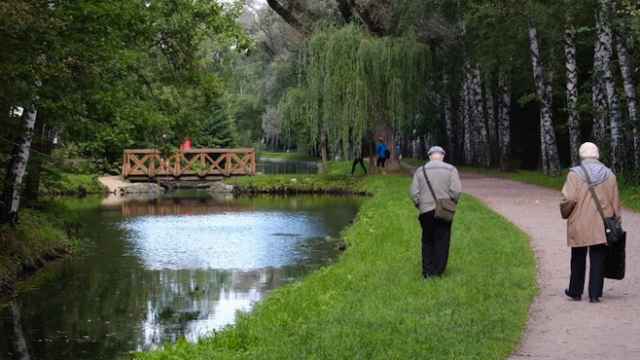Park Sokolniki in northeastern Moscow has opened a new attraction this summer that brings the culture of the Arctic to the Russian capital. Husky Park, located in the "camping" section of the vast park territory, gives Muscovites the chance to trade the traffic jams and concrete jungle of big city life for the traditions of the tundra.
Fifteen indigenous Chukchi people from the Arctic region of Chukotka work in the park, teaching visitors about the culture of their homeland, but the big attraction is the dogs.
"Most visitors come here to see our huskies and later get involved in various games, rituals and arts of the Northern peoples," Igor Kuzmin, the art director of Husky Park told the Moscow Times.
A visit to Husky Park begins with a small trail leading into the forest. In the shadow of the trees stand three small "chums," traditional Chukchi dwellings constructed of wooden sticks leaned together and covered with reindeer hide or felt.
Each chum in the park is dedicated to a particular theme — fishing, hunting and rituals.
At the ritual chum, guests experience a Chukchi ceremony called "feeding ghosts." In this ritual, a shaman starts a fire by rubbing a wooden doll known as a "gyrgyti" with deer antlers. The shaman then spreads smoke to purify the ground and protect newcomers from "bad ghosts."
Next to the fisherman's chum, there is a small pond and a bunch of dried fish hanging on trees. During a visit to this chum, guests learn how Northern fishermen, called "shoremen," prepare and catch fish.
The trees around the hunter's chum are covered with the pelts of white bears, wolves, wolverines and deer. Rostislav, who mans the hunter's chum, said he killed the wolverine himself with a trap.
Rostislav, who came to Moscow from Anadyr, the port town and administrative center of Chukotka, also teaches Husky Park visitors to shoot a bow — a weapon he has used to hunt bears and wolves in the tundra.
The park offers some other activities that imitate the hunting traditions of the indigenous Northern peoples. In one such game called "harpoon a whale" participants try to plunge a stick into a hole cut in a wooden fish on a rope. Another game involves trying to throw a lasso around deer antlers.
"Such games are important for Chukchi children — if they didn't learn that, they would die of hunger when they grow up," Igor Kuzmin said, adding that Chukotka natives are the only ones allowed to hunt whales in Russia since the marine mammals are a staple of their diet.
For those not interested in hunting traditions, there are demonstrations of traditional Chukchi arts. At the ritual chum, visitors can learn to play the vargan, a kind of mouth harp that is the chukchi national instrument. Guests can also take home a vargan made in Altai; they are available in the park's souvenir shop for 1,000 rubles ($18).
Around the campfire in the ritual chum, guests can also experience Chukchi traditional throat-singing, accompanied by beating drums and the howling of huskies.
As the park's name indicates, the huskies are the main attraction here. Visitors can take a husky for a walk on a leash or go on a ride in a small cart pulled by the dogs for an additional fee. Rides range from 500 rubles ($9) to 1,000 rubles ($18) depending on the distance.
Huskies, which were bred to live in permafrost and trained to pull sleds on snow, are very friendly, but cannot be let roam free. They are part wolf and nomadic by nature. If they are let free from their leashes, they run.
Tatyana, a visitor to the park, was thrilled with the chance to play with the huskies. "I got the chance here to meet these dogs in real life – it's such a rare opportunity in Moscow! They are fantastic!" she said.
Her friend Denis, however, found the cultural exhibit at least as interesting as the dogs: "It's very interesting for me to know how people in the farthest regions of Russia live. I discovered a whole new world today!"
Husky Park Sokolniki is open Tuesday-Friday from 12 pm.-7 p.m. and on Saturdays and Sundays from 3 p.m.-8 p.m. The park is closed on Monday. For more information, visit http://www.хаски-сокольники.рф.
A Message from The Moscow Times:
Dear readers,
We are facing unprecedented challenges. Russia's Prosecutor General's Office has designated The Moscow Times as an "undesirable" organization, criminalizing our work and putting our staff at risk of prosecution. This follows our earlier unjust labeling as a "foreign agent."
These actions are direct attempts to silence independent journalism in Russia. The authorities claim our work "discredits the decisions of the Russian leadership." We see things differently: we strive to provide accurate, unbiased reporting on Russia.
We, the journalists of The Moscow Times, refuse to be silenced. But to continue our work, we need your help.
Your support, no matter how small, makes a world of difference. If you can, please support us monthly starting from just $2. It's quick to set up, and every contribution makes a significant impact.
By supporting The Moscow Times, you're defending open, independent journalism in the face of repression. Thank you for standing with us.
Remind me later.





